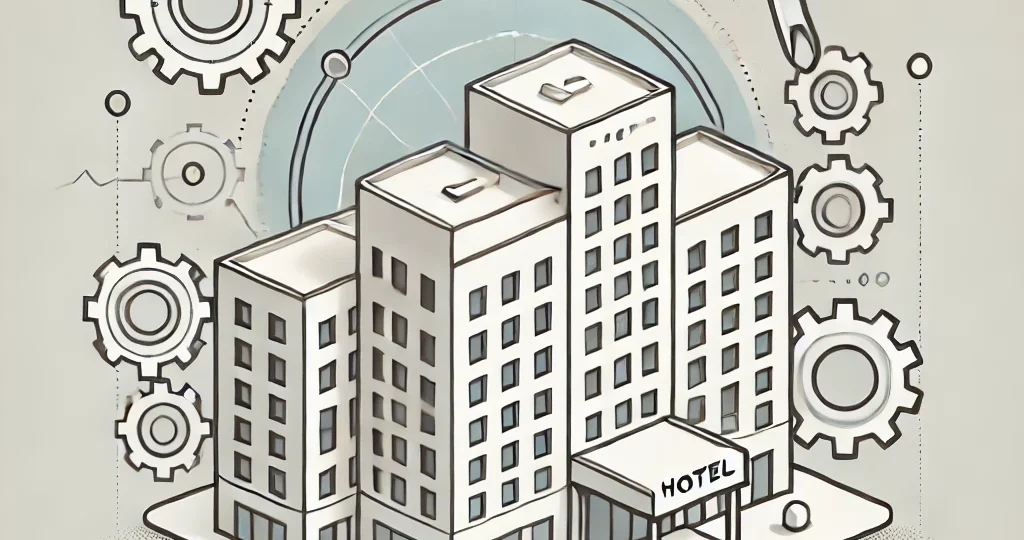How Engineering & Operational Support is Crucial to Running a Hotel?
The hospitality industry is a complex ecosystem where guest satisfaction is the ultimate goal. While much of the focus is often on front-facing operations like customer service and housekeeping, the backbone of a successful hotel lies in its engineering and operational support. This often-overlooked aspect is crucial to ensuring the smooth functioning of all hotel operations, from energy efficiency to equipment maintenance and overall guest experience.
In this blog, we’ll explore why engineering and operational support are essential in running a hotel, highlighting the key components and their impact on efficiency, sustainability, and profitability.
1. Ensuring Operational Continuity
Engineering and operational support play a pivotal role in maintaining the day-to-day functionality of a hotel. Behind the scenes, a team of specialized professionals ensures that everything from HVAC systems and elevators to water supply and lighting operates seamlessly.
Key Benefits:
- Minimized Downtime: Quick response to technical issues ensures minimal disruption to guest services.
- Consistent Comfort: Properly maintained systems guarantee a comfortable environment, which is a critical factor in guest satisfaction.
Real-Life Impact:
Consider a scenario where the air conditioning system in a tropical resort malfunctions. Without efficient engineering support, resolving such an issue could take hours or even days, leading to discomfort and potentially negative reviews.
2. Energy Efficiency and Sustainability
In an era where sustainability is no longer optional, hotels are under increasing pressure to adopt green practices. Engineering support is at the forefront of implementing energy-efficient systems and practices, from LED lighting and smart thermostats to renewable energy solutions like solar panels.
Why It Matters:
- Cost Savings: Energy-efficient systems significantly reduce utility bills, enhancing profitability.
- Eco-Friendly Appeal: Sustainable practices attract eco-conscious travelers, improving brand reputation.
Beyond the Basics:
Companies like Beyond Consultant specialize in energy conservation strategies, helping hotels reduce their carbon footprint without compromising on guest comfort.
3. Proactive Maintenance and Equipment Longevity
Preventive maintenance is a core aspect of engineering support. By regularly inspecting and servicing equipment, hotels can prevent costly breakdowns and extend the lifespan of critical assets.
Key Areas of Focus:
- HVAC Systems
- Plumbing and Water Systems
- Electrical Systems
- Kitchen and Laundry Equipment
The ROI of Proactive Maintenance:
While reactive maintenance may seem cost-effective in the short term, it often leads to higher expenses due to emergency repairs and the need for equipment replacement. Proactive maintenance, on the other hand, ensures long-term savings and uninterrupted service.
4. Cost Optimization Strategies
Operational efficiency isn’t just about maintaining functionality—it’s also about optimizing costs. Engineering teams work diligently to identify areas where expenses can be reduced without sacrificing quality.
Examples of Cost Optimization:
- Energy Audits: Identifying high-energy consumption areas and implementing more efficient alternatives.
- Resource Management: Ensuring optimal use of water, electricity, and other utilities.
- Vendor Negotiations: Securing cost-effective contracts for maintenance services and equipment procurement.
5. Enhancing Guest Experience Through Operational Excellence
Guests rarely notice the engineering side of hotel operations unless something goes wrong. However, operational excellence in this area directly impacts their overall experience. From the consistent temperature of their room to the reliability of elevators and the availability of hot water, every aspect of engineering support contributes to guest comfort.
Invisible Yet Essential:
When engineering and operational support are working optimally, guests enjoy a seamless experience. This often translates into higher guest satisfaction scores and increased loyalty.
6. Compliance with Health and Safety Standards
Hotels must adhere to stringent health and safety regulations to ensure the well-being of guests and staff. Engineering support teams play a critical role in maintaining these standards by regularly inspecting fire safety systems, water quality, and electrical installations.
Regulatory Compliance Includes:
- Fire Safety Systems: Ensuring fire alarms, extinguishers, and evacuation routes are up to code.
- Water Quality: Preventing issues like Legionella by maintaining water systems.
- Electrical Safety: Regular inspections to prevent hazards like electrical fires.
Why It’s Crucial:
Non-compliance can lead to severe penalties, reputational damage, and in extreme cases, the temporary closure of the hotel.
7. Adapting to Technological Advancements
The hospitality industry is continually evolving with new technologies designed to improve efficiency and guest satisfaction. Engineering teams are responsible for integrating these technologies into hotel operations.
Technological Innovations Include:
- Smart Room Systems: Allowing guests to control lighting, temperature, and entertainment through a single interface.
- Automated Maintenance Systems: Predicting potential equipment failures before they occur.
- Energy Management Systems: Using AI to optimize energy consumption based on occupancy and weather conditions.
Keeping Pace with Change:
By staying updated on technological advancements, hotels can offer cutting-edge amenities that set them apart from competitors.
8. Day-to-Day Monitoring for Continuous Improvement
Continuous monitoring is an integral part of operational support. It ensures that all systems are functioning as intended and provides valuable data for future improvements.
Monitoring Includes:
- Energy Usage: Tracking consumption patterns to identify inefficiencies.
- System Performance: Ensuring all mechanical and electrical systems operate at peak performance.
- Guest Feedback: Using insights from guest reviews to identify areas for technical improvement.
Why Continuous Monitoring Matters:
It allows hotels to stay proactive rather than reactive, addressing potential issues before they impact guests or escalate into costly repairs.
9. The Role of Outsourcing in Engineering & Operational Support
Many hotels are now outsourcing their engineering and operational support to specialized firms like Beyond Consultant. This approach provides access to a team of experts without the need for an in-house team, offering both cost savings and superior service.
Advantages of Outsourcing:
- Access to Expertise: Benefit from the knowledge of highly skilled professionals.
- Scalability: Adjust the level of support based on the hotel’s needs.
- Focus on Core Business: Allow hotel management to concentrate on guest-facing operations.
Conclusion: Engineering & Operational Support as the Foundation of Hotel Success
In the competitive world of hospitality, guest satisfaction is paramount, and it begins with the unseen but essential engineering and operational support. From ensuring operational continuity and energy efficiency to enhancing guest experience and staying compliant with health and safety standards, engineering teams form the backbone of a well-run hotel.
Partnering with a professional firm like Beyond Consultant can further enhance these efforts, offering expertise, cost optimization, and peace of mind. By prioritizing engineering and operational support, hotels can not only run more efficiently but also create a safe, comfortable, and memorable environment for their guests.
Ready to Optimize Your Hotel Operations?
Explore how Beyond Consultant can elevate your hotel’s engineering and operational support to ensure seamless, sustainable, and efficient operations.


















